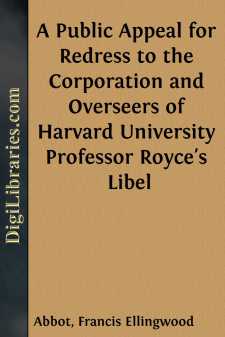Categories
- Antiques & Collectibles 13
- Architecture 36
- Art 48
- Bibles 22
- Biography & Autobiography 813
- Body, Mind & Spirit 142
- Business & Economics 28
- Children's Books 17
- Children's Fiction 14
- Computers 4
- Cooking 94
- Crafts & Hobbies 4
- Drama 346
- Education 46
- Family & Relationships 57
- Fiction 11829
- Games 19
- Gardening 17
- Health & Fitness 34
- History 1377
- House & Home 1
- Humor 147
- Juvenile Fiction 1873
- Juvenile Nonfiction 202
- Language Arts & Disciplines 88
- Law 16
- Literary Collections 686
- Literary Criticism 179
- Mathematics 13
- Medical 41
- Music 40
- Nature 179
- Non-Classifiable 1768
- Performing Arts 7
- Periodicals 1453
- Philosophy 64
- Photography 2
- Poetry 896
- Political Science 203
- Psychology 42
- Reference 154
- Religion 513
- Science 126
- Self-Help 84
- Social Science 81
- Sports & Recreation 34
- Study Aids 3
- Technology & Engineering 59
- Transportation 23
- Travel 463
- True Crime 29
A Public Appeal for Redress to the Corporation and Overseers of Harvard University Professor Royce's Libel
Categories:
Description:
Excerpt
PUBLIC APPEAL.
To the President and Fellows and Board of Overseers of Harvard University:
Gentlemen,—Believing it to be a necessary part of good citizenship to defend one's reputation against unjustifiable attacks, and believing you to have been unwarrantably, but not remotely, implicated in an unjustifiable attack upon my own reputation by Assistant Professor Josiah Royce, since his attack is made publicly, explicitly, and emphatically on the authority of his "professional" position as one of your agents and appointees, I respectfully apply to you for redress of the wrong, leaving it wholly to your own wisdom and sense of justice to decide what form such redress should take. If Dr. Royce had not, by clear and undeniable implication, appealed to your high sanction to sustain him in his attack,—if he had not undeniably sought to create a widespread but false public impression that, in making this attack, he spoke, and had a right to speak, with all the prestige and authority of Harvard University itself,—I should not have deemed it either necessary or becoming to appeal to you in self-defence, or, indeed, to take any public notice whatever of an attack otherwise unworthy of it. But under the circumstances I am confident that you will at once recognize the inevitableness and unquestionable propriety of my appeal from the employee to the employer, from the agent to the principal; and it would be disrespectful to you to doubt for a moment that, disapproving of an attack made impliedly and yet unwarrantably in your name, you will express your disapprobation in some just and appropriate manner. My action in thus laying the matter publicly before you can inflict no possible injury upon our honored and revered Alma Mater: injury to her is not even conceivable, except on the wildly improbable supposition of your being indifferent to a scandalous abuse of his position by one of your assistant professors, who, with no imaginable motive other than mere professional jealousy or rivalry of authorship, has gone to the unheard-of length of "professionally warning the public" against a peaceable and inoffensive private scholar, whose published arguments he has twice tried, but twice signally failed, to meet in an intellectual way. If the public at large should have reason to believe that conduct so scandalous as this in a Harvard professor will not be condemned by you, as incompatible with the dignity and the decencies of his office and with the rights of private citizens in general, Harvard University would indeed suffer, and ought to suffer; but it is wholly within your power to prevent the growth of so injurious a belief. I beg leave, therefore, to submit to you the following statement, and to solicit for it the patient and impartial consideration which the gravity of the case requires.
I.
The first number of a new quarterly periodical, the "International Journal of Ethics," published at Philadelphia in October, 1890, contained an ostensible review by Dr. Royce of my last book, "The Way out of Agnosticism." I advisedly use the word "ostensible," because the main purport and intention of the article were not at all to criticise a philosophy, but to sully the reputation of the philosopher, deprive him of public confidence, ridicule and misrepresent his labors, hold him up by name to public obloquy and contempt, destroy or lessen the circulation of his books, and, in general, to blacken and break down his literary reputation by any and every means, even to the extent of aspersing his personal reputation, although there had never been the slightest personal collision....


